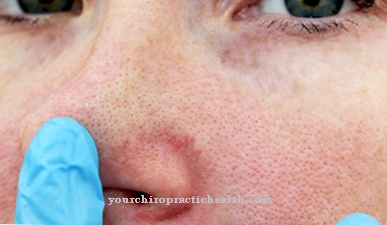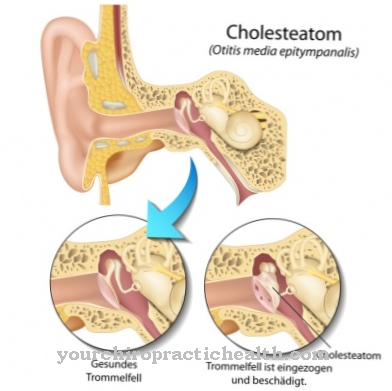An easy one Zinc deficiency occurs more often than you think. Serious zinc deficiency is diagnosed less often than one might fear. Both are also easy to treat. You can compensate for a zinc deficiency by improving your diet and, if necessary, by taking zinc supplements orally.
What is zinc deficiency?

Acute or chronic Zinc deficiency is an easily treatable disorder in the organism that is triggered by an inadequate intake, a situation or age-related excess consumption of zinc or a poor utilization of zinc.
A lack of zinc is based on the fact that zinc cannot be produced in the body. Sufficient quantities of it must be taken in daily through food. Otherwise there will be a latent, acute or chronic zinc deficiency and its consequences.
causes
As causes for one Zinc deficiency various factors can be named. An inadequate zinc intake or limited usability of zinc are often the cause of a zinc deficiency.
But also fasting cures and diets, a one-sided diet low in vital substances, occasionally strict vegetarianism, protein malnutrition or the constant consumption of phosphate-containing cola drinks can lead to a zinc deficiency.
Likewise, a prolonged calcium overdose as a result of osteoporosis, regular alcohol consumption, acute and chronic heavy metal exposure or inflammatory bowel diseases such as celiac disease and ulcerative colitis can cause a zinc deficiency.
Furthermore, hunger or anorexia, an increased blood sugar level, neurodermatitis, blood loss caused by surgery, profuse sweating or certain medications can lead to an acute or chronic zinc deficiency. Medicines that break down zinc include, for example, laxatives, dehydration preparations, cortisone or birth control pills.
In old age and in certain phases of life such as pregnancy, stress or growth phases, zinc consumption can also increase. It is more difficult to use zinc from plant-based foods. We therefore prevent zinc deficiency by consuming meat, cereals, dairy products or fish.
Symptoms, ailments & signs
Zinc is involved in numerous biochemical and physiological processes in the body and therefore the symptoms of a zinc deficiency can be very different. The first signs of a zinc deficiency are usually unspecific. These include frequent light colds, especially runny nose or tiredness and listlessness despite adequate sleep.
Due to a prolonged undersupply, the dysfunction of the immune system increases and the symptoms become clearer and more specific. Hair loss, brittle and split nails or flu-like effects can occur. The signs can be physical and mental / emotional in nature. In addition to taste disorders and delayed wound healing, it can also lead to concentration disorders and a general decline in performance.
In addition, some skin problems such as dry, flaky skin and various inflammatory reactions with pustules and redness can occur. Herpes is more common, especially on the lips. The oral cavity or the paranasal sinuses can also become inflamed repeatedly. Individual susceptibilities that already existed before a zinc deficiency cause increased discomfort in the event of an undersupply.
This can be the gastrointestinal area or the bladder. Zinc deficiency can lead to stunted growth in children. In the case of prolonged undersupply, irritability and depressive moods can indicate the zinc deficiency. Zinc deficiency can also affect the senses. This can be a visual impairment, especially in the dark.
Diagnosis & course
Diagnosis and course depend on Zinc deficiency on the degree of the defect, its duration and the consequences that have already occurred. Often a latent zinc deficiency is not noticed at all. It only lasts a certain time and then balances out again.
However, if you notice a tendency to skin inflammation, cracked and inflamed corners of the mouth, an increased susceptibility to infections or hair loss over a longer period of time, zinc deficiency can be the cause. Since the essential trace element has to be taken in through food, a low-zinc diet can cause an imbalance.
In the long run, there is a diagnosable zinc deficiency. However, it is rarely found in the blood count. Rather, certain symptoms suggest it. In the course of a chronic zinc deficiency, however, important functional circuits in the organism can be disturbed. Long-term zinc deficiency affects, for example, hormones, immune system, skin, eyesight, taste perception or blood quality.
Environmentally ill people who are exposed to heavy metal pollution must consider a lifelong increased zinc intake in order not to suffer from zinc deficiency. At the same time, the zinc helps to remove heavy metals. The same applies to diabetics. They suffer from zinc deficiency because they excrete zinc.
Complications
A number of complications can arise when there is a lack of zinc. At first, a deficiency in the trace element becomes noticeable through general symptoms such as tiredness, weakness and lack of drive. In the long run, these complaints can lead to a decrease in well-being and promote the development of mental illness. In the area of the sensory organs, visual disturbances such as night blindness, dry eyes and odor disorders occur.
In the area of the oral mucosa it can also lead to taste disorders and the development of ulcers and infections. In the skin, imperfections, but also serious skin changes such as acne or even dermatitis can occur. Fungal skin, eczema and pustules, especially on the fingers, on the face and in the anal and genital areas, can also occur. A zinc deficiency also increases the susceptibility to infection and can weaken the immune system in the long term.
Possible hormonal complications are erectile dysfunction up to infertility and growth disorders in children and adolescents. Treatment of a zinc deficiency does not cause any major complaints, apart from any side effects of the dietary supplements used. In individual cases, however, zinc poisoning can occur, which in the worst case leads to a coma.
When should you go to the doctor?
Consultation with a doctor is necessary if the person concerned suffers from health problems over a long period of time. A loss of drive, increased tiredness or a decrease in wellbeing are signs of an existing illness or deficiency. Medical tests are required so that the cause can be clarified. If there are disturbances in concentration, delayed wound healing, hair loss or abnormalities and irregularities of the nails in everyday life, a visit to a doctor is advisable.
There is cause for concern in the case of taste disorders, peculiarities of the skin texture and recurring colds. If the physical as well as the mental performance drops, this indicates a disorder. A loss of zest for life, mood swings and a depressive attitude towards life can also be described as unusual. If the changes increase continuously, this indicates an irregularity in the organism.
If there is no triggering stimulus for this development from an objective observation of the living situation, the observations should be discussed with a doctor. Consult a doctor as soon as possible if your eyesight is impaired. A control visit should also take place if the person concerned suffers from abnormalities in the area of the oral cavity or the paranasal sinuses. Redness in the mouth, taste disorders as well as herpes are warning signals of the organism and need medical care.
Treatment & Therapy
Treatment of Zinc deficiency can be done through a change in diet and oral substitution with food supplements.
In most cases, the zinc deficit can then be quickly compensated for. In some cases of zinc deficiency - for example in the case of severe diabetes or a chronic environmental disease due to heavy metal pollution - permanent administration of zinc supplements can be considered. A zinc deficiency should also be compensated for in old age or during pregnancy and breastfeeding.
prevention
As a sensible prevention against Zinc deficiency an adequate supply through nutrition makes sense. At the same time, excessive degradation of zinc must be ruled out.
The complete renunciation of meat is just as responsible for a zinc deficiency as the massive consumption of phosphate-containing cola drinks or ready meals. In addition, certain weight loss diets and slimming diets can cause zinc deficiency. Alcoholic beverages should be avoided as far as possible to prevent zinc deficiency. They interfere with zinc absorption, but also ensure a higher zinc excretion.
Inflammatory diseases of the gastric and intestinal mucosa - for example ulcerative colitis or celiac disease - must be treated in order to prevent a later zinc deficiency.
Aftercare
Follow-up care for a zinc deficiency depends on the causes of the deficiency. If the zinc deficiency can only be attributed to a low-zinc diet, care should be taken to ensure that the mineral is adequately absorbed through the diet even after successful treatment. Regular consumption of zinc-containing foods such as red meat, fish, seafood, milk and dairy products as well as sourdough-based whole grain products effectively prevents future symptoms of deficiency.
Affected vegetarians or vegans can alternatively integrate plant-based zinc suppliers such as nuts, lentils, oilseeds and white beans into their diet. Since the human body can absorb zinc from plant-based food much more poorly than zinc from animal food, larger amounts are required in this case. With an overall varied diet, those affected can keep their zinc balance stable over the long term.
Dietary supplements that were taken briefly to treat the acute deficiency should, however, only be used over a longer period after consulting a doctor. Otherwise there is a risk of an equally harmful oversupply of the mineral. This can lead to zinc poisoning with permanent damage. If the causes of the zinc deficiency can be found in connection with another underlying disease, follow-up care is based on the respective clinical picture and its prognosis. If the disease is successfully treated, no additional follow-up care is usually required.
You can do that yourself
The most important measure for self-help with zinc deficiency is a consistent change in diet. The person affected should consume more animal products, as zinc is mainly contained in these. Vegetable zinc, on the other hand, cannot be easily absorbed by the body. However, vegetarians and people with increased needs can also consume zinc in the form of dietary supplements. The daily dose of 10 mg should not be exceeded with such preparations. In addition, they should not be taken together with other food supplements, but rather after two to three hours.
Otherwise it is advisable to mainly eat offal and red meat such as beef, as these have a particularly high zinc content. Foods such as dairy products, various oil seeds, pumpkin seeds, peas, white beans, lentils, nuts, oatmeal, fish and seafood are also particularly rich in zinc.
The diet should be varied and diverse. However, industrially produced foods such as finished products or fast food should be avoided. Sugary drinks such as cola are also not recommended if you have a zinc deficiency. Affected smokers should reduce or quit smoking completely. They have an increased need for zinc. In addition, you should initially refrain from consuming alcohol.


.jpg)

.jpg)
.jpg)
.jpg)

















.jpg)



